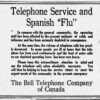In a short span of time, the COVID-19 virus has changed all of our lives significantly. Our schedules, our routines, our way of dealing with others (even friends and family) has been altered in a major way. It arrived suddenly, overwhelmed an unprepared population and left government officials scrambling to make decisions to slow the spread of the pandemic. All of which bear eerie similarities to the Spanish influenza a century ago.
Just as in 2020, the government issued orders to stem the spread. The Board of Health closed schools and theatres and, eventually, churches, pool halls and bowling alleys. Retail merchants – except for grocery, drug, stationery and book stores – were required to close shop at 4 p.m.
Civil servants were ordered off the job by 3 p.m. Major sports events were cancelled, including an international plowing match (despite the protests of organizers). Streetcars were required to keep ventilators open, limit passenger counts to the number of seats, and each were fumigated with formaldehyde daily.
OBJ360 (Sponsored)

What’s happening in Ottawa in 2024? Ottawa Tourism has your activity line-up covered
2024 promises to be another fun-filled year for Ottawans and visitors alike!

Lanark County: One county, nine districts, limitless adventures
Enjoy unique outdoors experiences you can’t find anywhere else

The Bell Telephone Company lost many employees to the flu. Yet with so many people ill and isolated at home, call volumes exploded, leading to a public warning to use telephones only when absolutely necessary.
Read the full column here.
Dave Allston is a local historian and the author of The Kitchissippi Museum. His Early Days column regularly appears in the Kitchissippi Times. Read the latest issue here.





